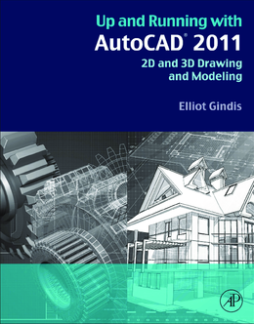
Additional Information
Book Details
Abstract
Up and Running with AutoCAD 2011: 2D and 3D Drawing and Modeling provides an introduction to the fundamental concepts of AutoCAD. These concepts have been distilled down to basic, easy to understand explanations for the benefit of beginner students. Each chapter explains the new concept or command and why it is important. Readers are given the chance to apply just-learned knowledge to a real-life exercise, drawing, or model. They can also test their knowledge with end-of-chapter quizzes and drawing exercises.
The book is organized into three parts: Level 1, Level 2, and Level 3. Level 1 offers a wide breadth of knowledge on many topics. Its chapters comprise the complete essential knowledge set of an intermediate user. Students can then work on, if not necessarily set up and manage, moderate to complex drawings. Level 2 is meant for advanced users who are CAD managers, full-time AutoCAD draftspersons, architects, or self-employed and must do everything themselves. The goal here is depth, and several features not deemed critically important in Level 1 are revisited to explore additional advanced options. Also introduced are advanced topics necessary to set up and manage complex drawings. Level 3 is all about 3D. Solid knowledge of the previous two levels is highly recommended before starting these chapters. The 3D material covers all aspects of AutoCAD solid modeling, including lights and rendering.
- Strips away complexities, both real and perceived and reduces AutoCAD to easy-to-understand basic concepts
- Teaches only what is essential to operating AutoCAD first, thereby immediately building student confidence
- All basic commands are documented step-by-step, meaning that what the student needs to type in and how AutoCAD responds is all spelled out in discrete and clear steps with screen shots added as needed
- Using the author’s extensive multi-industry knowledge of what is important and widely used in practice versus what is not, the material is presented by immediately immersing the student in practical, critically essential knowledge, with no padding of text or filler material
- All concepts are explained first in theory, and only then is AutoCAD introduced and the actual “button pushing discussed. This is one of the key concepts in having students understand exactly what it is they are doing and why, before they do it
